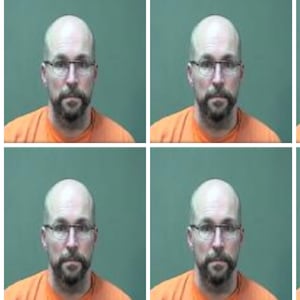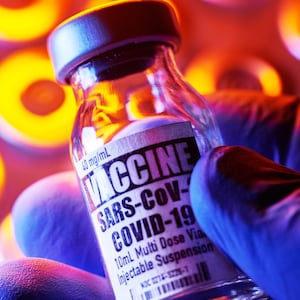If two doses of a vaccine are 95 percent effective in protecting you from COVID, then taking just one dose should still offer some protection while doubling the number of people a given supply of vaccine can cover, right?
It’s not that simple, experts say. And despite everyone from credentialed epidemiologists to Florida Gov. Ron DeSantis to the U.K. government endorsing some version of the idea, most experts say going rogue on the two-dose regimen could backfire big time.
Welcome to Rabbit Hole, where we dive deep on the biggest story. It’s for Beast Inside members only. Join up today.
If the pharmaceutical industry has designed a vaccine for two doses—an initial shot, then a booster shot around three weeks later—and the U.S. Food and Drug Administration has authorized the vaccine on the basis of two shots, then you’d better get both doses. You wouldn’t take half of your insulin or half of your birth-control or get half a surgery, would you?
For the same reason, you shouldn’t get half a vaccination.
“In short, I think it’s a bad idea,” Paul Offit, director of the Vaccine Education Center at the Children’s Hospital of Philadelphia, told The Daily Beast in reference to the half-dose concept.
Nevertheless, this idea is catching on in certain political and epidemiological circles—some of them more mainstream than others.
“Just get as many doses out there,” Florida Gov. Ron DeSantis said a couple weeks ago as the initial batches of the vaccine that Pfizer co-developed with BioNTech were shipping from the company’s Kalamazoo factory. “I’m not sure that Pfizer would agree or FDA would agree, but I think just the point is, getting that first dose out really does make a difference, and I think you’ll see that.”
Pfizer and the FDA do not agree.
In an op-ed in The New York Times the same week, columnist Zeynep Tufekci and Michael Mina, an assistant professor of epidemiology at the Harvard T.H. Chan School of Public Health, echoed DeSantis’ speculation, citing a report Moderna submitted to the FDA’s Vaccines and Related Biological Products Advisory Committee Meeting, which advises the agency on vaccine approvals.
The FDA gave Moderna’s vaccine the nod for emergency use shortly after greenlighting Pfizer’s vaccine.
“There are clues for a tantalizing possibility: that even a single dose may provide significant levels of protection against the disease,” Tufekci and Mina wrote about Moderna’s vaccine. “If that’s shown to be the case, this would be a game-changer, allowing us to vaccinate up to twice the number of people.”
Actually, the “clues” Tufekci and Mina referred to are pretty ambiguous. “Secondary efficacy analyses suggested benefit of the vaccine in preventing severe COVID-19 ... in preventing COVID-19 following the first dose, and in preventing COVID-19 in individuals with prior SARS-CoV-2 infection,” the Moderna report states.
But, crucially, it added: “Available data for some of these outcomes did not allow for firm conclusions.”
Tufekci and Mina really went out on a limb in their selective reading of the report, experts said.

Seniors and first responders wait in line to receive a COVID-19 vaccine at the Lakes Regional Library on Dec. 30, 2020, in Fort Myers, Florida.
Octavio Jones/Getty“It is a risky proposition to retrospectively go back and cherry-pick the results to determine that one dose is enough,” Lawrence Gostin, a Georgetown University global-health expert, told The Daily Beast. (The op-ed authors argued for further study rather than rolling out a new regimen right away.)
The single-dose idea, while seemingly attractive on its face, risks squandering potentially millions of precious vaccine doses and setting back America’s coronavirus vaccination effort by months, health experts told The Daily Beast. That setback could translate into tens of thousands of unnecessary deaths.
DeSantis’ office, Mina, Tufekci, and representatives of the Harvard T.H. Chan School of Public Health did not respond to requests for comment.
Scientists have no hard data on whether a single dose of a two-dose vaccine, taken all by itself, offers meaningful protection in the medium- or long-term. Sure, if we doled out Pfizer and Moderna’s vaccines in single doses instead of the prescribed two doses, we’d double the number of people getting shots in coming weeks and months. And some of the recipients might find themselves enjoying a level of protection for a short period.
But it’s also possible those single shots would do little or nothing to protect people from infection. In that case, you might as well pour the doses down the drain. The benefit to individuals, and the whole U.S. population, would be roughly the same.
The FDA is clear on this point. “The Pfizer-BioNTech COVID-19 vaccine is administered intramuscularly as a series of two doses… three weeks apart,” the FDA states on its website. “The vaccine was not studied for use as a single dose.”
“Individuals who have received one dose of the Pfizer-BioNTech COVID-19 vaccine should receive a second dose of Pfizer-BioNTech COVID-19 vaccine on schedule to complete the vaccination series,” the FDA continues.
The same guidance also applies to Moderna’s vaccine, which relies on the same messenger-RNA technology as Pfizer’s.
The FDA declined to respond on the record to specific questions about the one-dose idea. The U.S. Centers for Disease Control and Prevention, Pfizer, and Moderna, also did not respond to queries, but Pfizer previously told Axios there was no evidence suggesting one dose offered protection after 21 days.
Experts The Daily Beast spoke to were unequivocal, however. The theory that a single dose might work is sound, they said. But actual data on a single dose’s effectiveness simply doesn’t exist.
Jeffrey Klausner, a professor of medicine and public health at UCLA who previously worked at the CDC, told The Daily Beast he thinks a single dose of an mRNA vaccine might be 50 percent effective, meaning it confers some degree of immunity in half the people who take it.
But that’s just an estimate, albeit one echoed by Pfizer’s own senior vice president of Pfizer Vaccine Clinical Research and Development. “It is not clear what the consequences would be if the booster second dose is not given within the three-to-four week timeframe,” Edwin Michael, an epidemiologist at the Center for Global Health Infectious Disease Research at the University of South Florida, told The Daily Beast.
Any protection might prove fleeting. “We have no idea about how long immunity following one dose would last,” Offit added.
Authorities in the United Kingdom are gambling that single-dose immunity lingers—or at least could buy them time. U.K. health officials are asking doctors in that country to delay, beyond three weeks, the booster shot for two-dose vaccines, all in the hope of getting more people their first shot faster.
But doctors reportedly are pushing back against even that slight nod toward a single-dose strategy—and for good reason. “We don’t have the data to be confident that a single dose will provide sustained immunity,” Irwin Redlener, the founding director of Columbia University’s National Center for Disaster Preparedness, told The Daily Beast. He noted that even if a government or other respected entity were to continue calling for a second dose but suggest it could be put off, that might sabotage efforts at completing the regimen.
“The chances of many people not coming back for the booster will rise incrementally,” he said.
All that is to say that drawing single-dose conclusions from two-dose trials “is not appropriate for dictating vaccination policy,” Pierre Mourad, a University of Washington bio-engineer, told The Daily Beast.
Even Mina and Tufekci, in their pro-single-dose column, stressed the importance of following FDA guidelines. However, they argued that the FDA should sponsor trials testing out single-dose regimens of the existing two-dose vaccines: “We must act fast and must quickly acquire more data.”
But “quickly” to an epidemiologist isn’t really all the quick. “Ideally, we need data after one dose at two months to determine efficacy and then more data at three and six months,” Klausner said.
A new six-month trial could take nearly a year to organize, run, and assess. By then, Johnson and Johnson’s single-dose vaccine could be in wide circulation, rendering somewhat moot the question of whether Pfizer and Moderna’s vaccines would work with just one shot.
“I also don’t foresee that the FDA has the appetite to collect the data and change its [emergency-use authorization] to include one dose,” Gostin said. “By the time it had the data it needed, the vaccine scarcity we now are experiencing will likely be over.”
We have two vaccines thoroughly backed by sound data. They’re both in production and flowing, however slowly, to the states for administering. Both vaccines are designed for two doses.
It’s not a perfect system, but it’s one we can have confidence in. “Calling for changes now without data... will be unlikely to advance our collective goals of saving lives and ending the pandemic,” Jennifer Reich, a University of Colorado sociologist who studies immunization, told The Daily Beast.
The coming months are, of course, looking pretty bleak as people grow still more weary of social distancing, a new and potentially more infectious strain of the novel coronavirus spreads across the United States, and industry and government struggle to get shots in arms. Reports of vaccine doses being deliberately destroyed only add to the sense of national dread.
“We’re going to have a horrible January and February with lots and lots of fatalities—it’s almost inevitable,” Redlener said.
So yes, health officials should be open to bold new ideas—within reason. “The longer we wait to be innovative and creative about how we’re going to manufacture, distribute, and administer vaccine, the more lives will be lost—no question about that,” Redlener said. “On other hand, we can’t just experiment without data.”
And taking just one dose of a two-dose vaccine is clearly an idea with no good data behind it. If we start skipping booster doses, we just might realize, a few weeks or months from now, that the effects of a single shot fade quickly.
By then, it will be too late. In a desperate bid to double our supply of the vaccine, we’ll have squandered a hell of a lot of it.




